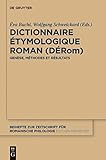Dictionnaire Étymologique Roman (DÉRom) : Genèse, méthodes et résultats / Éva Buchi, Wolfgang Schweickard.
Material type: TextSeries: Beihefte zur Zeitschrift für romanische Philologie ; 381Publisher: Berlin ; Boston : De Gruyter, [2014]Copyright date: ©2015Description: 1 online resource (730 p.)Content type:
TextSeries: Beihefte zur Zeitschrift für romanische Philologie ; 381Publisher: Berlin ; Boston : De Gruyter, [2014]Copyright date: ©2015Description: 1 online resource (730 p.)Content type: - 9783110312447
- 9783110394863
- 9783110313482
- 440/.042 23
- PC305 .D53 2014
- online - DeGruyter
- Issued also in print.
| Item type | Current library | Call number | URL | Status | Notes | Barcode | |
|---|---|---|---|---|---|---|---|
 eBook
eBook
|
Biblioteca "Angelicum" Pont. Univ. S.Tommaso d'Aquino Nuvola online | online - DeGruyter (Browse shelf(Opens below)) | Online access | Not for loan (Accesso limitato) | Accesso per gli utenti autorizzati / Access for authorized users | (dgr)9783110313482 |
Browsing Biblioteca "Angelicum" Pont. Univ. S.Tommaso d'Aquino shelves, Shelving location: Nuvola online Close shelf browser (Hides shelf browser)

|

|

|

|

|

|

|
||
| online - DeGruyter Manuel des frontières linguistiques dans la Romania / | online - DeGruyter Theologie(n) an der Universität : Akademische Herausforderung im säkularen Umfeld / | online - DeGruyter Sprachwandelvergleich – Comparing Diachronies / | online - DeGruyter Dictionnaire Étymologique Roman (DÉRom) : Genèse, méthodes et résultats / | online - DeGruyter Manuel des langues de spécialité / | online - DeGruyter Sprachliche Interaktion : Eine Einführung anhand von 22 Klassikern / | online - DeGruyter Die Braut des Königs : Zur interreligiösen Dynamik der mittelhochdeutschen Brautwerbungserzählungen / |
Frontmatter -- Comment citer le DÉRom -- Table des matières -- Avant-propos -- I. Partie théorique et méthodologique -- 1. Partie théorique et méthodologique -- 2. Principes méthodologiques régissant le projet -- 3. Réception du projet -- 4. Liste des publications du DÉRom -- II. Partie lexicographique -- 1. Articles -- 2. Abréviations et signes conventionnels -- 3. Bibliographie
restricted access online access with authorization star
http://purl.org/coar/access_right/c_16ec
Le Dictionnaire Étymologique Roman (DÉRom) constitue la première tentative d’étymologisation du lexique héréditaire roman depuis le REW. Se détournant des pratiques reconnues en étymologie romane, le DÉRom adopte une méthode jugée jusque là peu rentable en raison du témoignage massif du latin écrit : la grammaire comparée-reconstruction. Le présent volume comporte un choix d’articles lexicographiques, rédigés par une quarantaine de linguistes romanistes, précédés d’une présentation détaillée des prémisses théoriques et méthodologiques du dictionnaire.
The Dictionnaire Étymologique Roman (DÉRom) presents the first attempt at etymologizing the ancestral vocabulary of the Romance languages since the publication of Meyer-Lübke’s REW. Deviating from practices commonly accepted and applied in etymological research, the DÉRom adopts a method that has so far, due to the extensive documentation of written Latin, been dismissed as being little viable for Romance Studies: the comparative analysis of grammar, used to reconstruct proto-Romance lexemes. This volume contains some 250 articles, written and revised by 40 specialists in Romance linguistics based in twelve countries, as well as a detailed presentation of the theoretical groundwork of this project.
Issued also in print.
Mode of access: Internet via World Wide Web.
In French.
Description based on online resource; title from PDF title page (publisher's Web site, viewed 25. Jun 2024)


